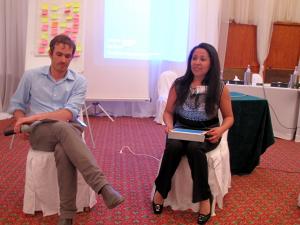By Mawaki Chango Publisher: APCNews
Published onPage last updated on

The first part of APC’s presentation on the ITU was designed to help participants understand the debate around current ITU policy processes as well as to provide the context for the debate around ITU’s claim to a prominent role in IG and public policy issues and why many civil society organisations reject its claim.
Here is a summary of the presentation:
The ITU regulates its major fields of activity with basic instruments called Administrative Regulations. They include the International Telecommunication Regulations (ITRs) and Radio Regulations. Together, the Constitution, the Convention, the Radio Regulations and the International Telecommunication Regulations are ITU’s four basic treaties.
The ITRs define the general principles for the provision and operation of international telecommunication services with an aim to facilitating interconnection and interoperability while enabling the harmonious development of related technical facilities. The last ratified ITRs treaty was agreed upon in Melbourne in 1988 and signed by 178 countries. The negotiations of the latest version of the treaty culminated during the World Conference on International Telecommunications (WCIT) in Dubai last December with a text that has left the international community split. By the end of the Conference, signatories of the final acts counted 89 countries with 55 opposing the new version of the treaty. The text is still being considered for signature by a number of countries and most still have to ratify it.
The second part of the presentation introduced the audience to the UPR process. The 2011 report by the United Nation’s Special Rapporteur Frank La Rue was presented because it offers some guidance adapted to the internet era for the reading of the Article 19 of the Universal Declaration of Human Rights (UDHR) and the International Covenant on Civic and Political Rights (ICCPR). The report has asserted that the right of all individuals to seek, receive and impart information and ideas of all kinds applies to the internet; that this is a fundamental right as well as an enabler of other human rights. The presentation went on to deliver a primer on the UPR, emphasizing the upcoming reviews and encouraging participants to get involved as stakeholders.
From the presentation:
The Human Rights Council (HRC) started the UPR in April 2008 in order to review and help improve the human rights records of every UN member state. All 193 members go through the Review in turn, after which starts a new cycle. Around 42 states are reviewed per year, making each review cycle last about 4.5 years. Currently and since 2012 we are in the second cycle.
The Review is a three-stage process, including a national preparation and consultation, the Review at the Council (conducted through the UPR Working Group and then the Plenary), and the implementation of the recommendations provided as the outcome of the initial or previous review. The whole process is carried out using three reports: the state report, the stakeholder report where civil society can contribute, and the United Nations (UN) summary report. Any stakeholder can submit a report on the state being reviewed and ECOSOC accredited NGOs can take the floor during the Review, although in the end it is a state-driven process and only states make recommendations.
The Review records are public, including the states’ Recommendations as well as the voluntary Pledges made by the state under review (SUR). Civil society will need to reach out to various relevant entities in the country, including diplomatic representations and other institutions that can be strategic partners in advancing the cause of the recommendations they most care about.
To close the workshop, a simulation exercise was organised around a Virtual Arab State. Four groups were formed: Group One represented the stakeholders; Group Two was the national institution on human rights which had the option to decide whether they were government-aligned or independent and willing to support the stakeholder group; Group Three was the population of foreign representatives and international partners present in the country under review; and Group Four was the HRC.
The SUR, the so-called Virtual Arab State, was represented by just one individual. The virtualisation of the SUR was key in enabling the audience to play with the HR violations they felt more comfortable with, such as freedom of expression. The simulation allowed the audience to ask more questions on the UPR processes as they had to understand and carry out their role.
In the final stage of the simulation activity, APC seeded a discussion within the group on the topic of the internet and human rights: Is internet access a human right or not? If yes, is it covered by the UDHR or does it require a specific legal instrument? Frank La Rue’s report and the subsequent UN’s 2012 resolution recognising that internet access was a human right were referenced extensively during the discussion. In the end, participants felt strongly that there is a need for some mechanism to compel their national governments to recognize and abide by internet-related human rights.


